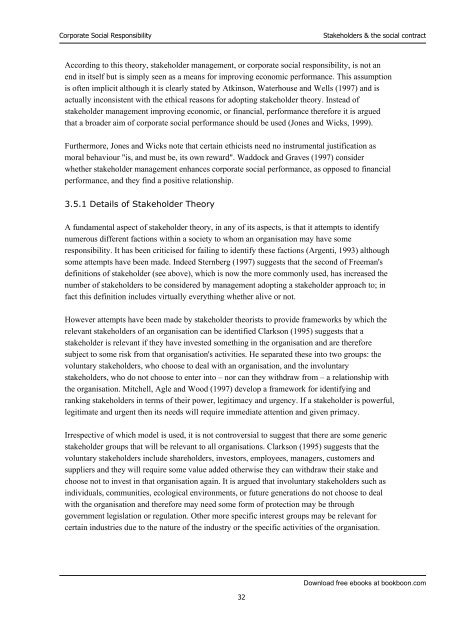Defining Corporate Social Responsibility - Tutorsindia
Defining Corporate Social Responsibility - Tutorsindia
Defining Corporate Social Responsibility - Tutorsindia
Create successful ePaper yourself
Turn your PDF publications into a flip-book with our unique Google optimized e-Paper software.
<strong>Corporate</strong> <strong>Social</strong> <strong>Responsibility</strong><br />
Stakeholders & the social contract<br />
According to this theory, stakeholder management, or corporate social responsibility, is not an<br />
end in itself but is simply seen as a means for improving economic performance. This assumption<br />
is often implicit although it is clearly stated by Atkinson, Waterhouse and Wells (1997) and is<br />
actually inconsistent with the ethical reasons for adopting stakeholder theory. Instead of<br />
stakeholder management improving economic, or financial, performance therefore it is argued<br />
that a broader aim of corporate social performance should be used (Jones and Wicks, 1999).<br />
Furthermore, Jones and Wicks note that certain ethicists need no instrumental justification as<br />
moral behaviour "is, and must be, its own reward". Waddock and Graves (1997) consider<br />
whether stakeholder management enhances corporate social performance, as opposed to financial<br />
performance, and they find a positive relationship.<br />
3.5.1 Details of Stakeholder Theory<br />
A fundamental aspect of stakeholder theory, in any of its aspects, is that it attempts to identify<br />
numerous different factions within a society to whom an organisation may have some<br />
responsibility. It has been criticised for failing to identify these factions (Argenti, 1993) although<br />
some attempts have been made. Indeed Sternberg (1997) suggests that the second of Freeman's<br />
definitions of stakeholder (see above), which is now the more commonly used, has increased the<br />
number of stakeholders to be considered by management adopting a stakeholder approach to; in<br />
fact this definition includes virtually everything whether alive or not.<br />
However attempts have been made by stakeholder theorists to provide frameworks by which the<br />
relevant stakeholders of an organisation can be identified Clarkson (1995) suggests that a<br />
stakeholder is relevant if they have invested something in the organisation and are therefore<br />
subject to some risk from that organisation's activities. He separated these into two groups: the<br />
voluntary stakeholders, who choose to deal with an organisation, and the involuntary<br />
stakeholders, who do not choose to enter into – nor can they withdraw from – a relationship with<br />
the organisation. Mitchell, Agle and Wood (1997) develop a framework for identifying and<br />
ranking stakeholders in terms of their power, legitimacy and urgency. If a stakeholder is powerful,<br />
legitimate and urgent then its needs will require immediate attention and given primacy.<br />
Irrespective of which model is used, it is not controversial to suggest that there are some generic<br />
stakeholder groups that will be relevant to all organisations. Clarkson (1995) suggests that the<br />
voluntary stakeholders include shareholders, investors, employees, managers, customers and<br />
suppliers and they will require some value added otherwise they can withdraw their stake and<br />
choose not to invest in that organisation again. It is argued that involuntary stakeholders such as<br />
individuals, communities, ecological environments, or future generations do not choose to deal<br />
with the organisation and therefore may need some form of protection may be through<br />
government legislation or regulation. Other more specific interest groups may be relevant for<br />
certain industries due to the nature of the industry or the specific activities of the organisation.<br />
32<br />
Download free ebooks at bookboon.com
















